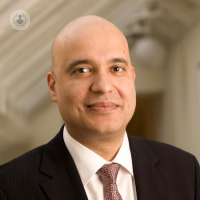Difficulty in swallowing (Dysphagia)
Written in association with:Dysphagia is difficulty in normal swallowing, which can range from a minor sensation of something stuck in the throat, coughing during eating, to having to constantly spit out saliva.

Causes of swallowing problems
The exact cause of dysphagia is unknown as it has so many different causes, such as:
- Neurological conditions (including stroke)
- Strictures from acid reflux
- Head, neck, oesophageal and brain tumours
- After surgery - including surgery on the neck, skull base, brain and laser surgery to the throat
- Radiotherapy to the neck or brain
- Inflammatory/auto-immune disorders
How to diagnose dysphagia
Diagnosis of dysphagia is usually made on taking a medical history from a patient. Some patients may not be aware of swallowing problems, present with recurrent chest infections, through silently breathing in food and drink.
Severity of the dysphagia is assessed clinically but also through specialist tests such as X-Ray videos of the patient swallowing (videofluoroscopy) and direct observations of the patient swallowing with a trans-nasal flexible camera device (fibreoptic endoscopic evaluation of swallowing).
Dysphagia is usually managed by specialist multidisciplinary teams (MDTs). The aims are to gain sufficient nutrition, protect the airway and allow for the pleasures of taste and social aspects of eating.
Treatment of dysphagia
Dysphagia treatment very much depends on the cause. Where possible, the priority is to treat the underlying medical condition.
The patient could simply be advised to modify the consistency or types of food they eat. There are also strengthening exercises, such as exercising the swallowing muscles and head and neck manoeuvres to make each swallow safer.
Alternative feeding methods such as nasal, or directly into the stomach feeding tubes, may be considered for the short- or long-term in more severe cases.
Surgery for swallowing difficulties
Surgical techniques that improve the swallow mechanism again depend on the underlying cause. They are varied and should only be offered by dysphagia specialists. These may include a tracheostomy to look after the airway, swallowing muscles surgery or on the vocal cords or pharyngeal pouch surgery. Other procedures include diverting the airway to a hole in the neck or even removing the larynx.
If you require expert treatment for dysphagia, arrange an appointment with Professor Sandhu via his Top Doctors profile.


